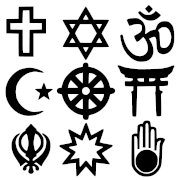Search the Scriptures; for in them ye think ye have eternal life: and they are they which testify of me.- Jn 5:39.
We know that the story of Jesus Christ was encrypted, as it were, or enfolded in the Old Testament Scriptures. Yet when a non-converted Jew reads the text, he is blinded as by a veil (2Cor 3:14-15).
Clement of Alexandria applied this idea to the philosophers of Greece, that the Logos was hidden within philosophy as it was in the Torah.
The question is, if we believe the above, how far could this idea of the Logos be extended toward the religious texts and philosophies of the world?
I have seen a balance between these two texts:
Who changed the truth of God into a lie Rom 1:25; and,
and that no lie is of the truth. 1Jn 2:21b.
That the other religions of the world according to the light they had, transformed that into a lie, based on their human understandings, or even demonic deception.
And while the lie can be
deciphered back into the truth, the lie is not
equal to the truth.
So there is no confusion, not all religious texts are created equal. And yet the Logos may well be hidden within for a seeker to perhaps discover.
This may be done in a number of ways, through symbols, or an area I've not fully explored yet, gematria.
For the first, an example would be: Krishna, of the Baghavad Gita as being a shepherd, as was our Lord. And he attracted the gopika-cow herding girls, even as Christ woos our hearts as His Bride, His virgins, as in Song of Songs.
And I think that there are really only two religions in the world, as prototypically portrayed in the narrative of Cain and Abel (Gen 4):
That of Cain: Representing human efforts, and trust in one's own good works in order to be accepted by God. and-
That of Abel: Being the religion of love and trust, not in one's self, but in the mercy of God, and in the shed blood of the Atoning Lamb in order to be accepted by God.
I had also thought of Justin Martyr, but it had been a while since I read of his view on this matter. As to the
spermatikoi, I know that he believed that the seeds were planted in all the various philosophies of his day. I read last night a quote of his,
It is our belief that those men who strive to do the good which is enjoined on us have a share in God; according to our traditional belief they will by God's grace share in his dwelling. And it is our conviction that this holds good in principle for all men.Further the above passage continues:
Christ is the divine Word in whom the whole human race share, and those who live according to the light of their knowledge are Christians, even if they are considered as being godless- I
Apology 46, 1-4
What implications does the above have in today's pluralistic society? And what of the exclusivist approach to evangelism? Most importantly (in my mind) what of evangelism in the context of a more inclusive approach?
This in no wise means that all scriptures or holy books are equal, nor does it mean that the uniqueness of the Judeo-Christian Bible is to be somehow diminished, but rather exalted in its true Superiority.
On one hand, neither Satan, nor any deceived person could ever create their own
truth, as that is impossible. "God forbid: yea, let God be true, but every man a liar"- Rom 3:4a. Thus no lie is of the truth.
On the other hand, the truths available to mankind, and we know this to have occurred at the tower of Babel, were twisted, or changed to exalt the creation over the creator as Paul said.
The idea of "miracles" can apply here. Occultists may perform false miracles by manipulating psychic or spiritual laws, as happened before Pharaoh when Moses and the Egyptian magicians had a showdown. But they could not imitate a true creative miracle when dust was turned to lice, because a true miracle is above even spiritual 'law'.
So it is with Truth, Who is the Logos. Man can manipulate truths to fit their own ends, and thus change it, at least in appearance and application. But the Truth itself is metaphysical, and beyond the reach of man's lying tongue. Thus no lie is of the Truth.
In this way, as the Logos incarnated as Jesus Christ. So it is in all His expressions in all texts of the world, be they religious or philosophical. I would say even fiction and nonfiction works of literature. Though it may not be apparent on the surface text. But there is a sub-text which makes understanding any writ, or language (or even any phenomenon whatsoever) cognitive, or logical, structured or intelligible. Thus the Scripture states,
And the light shineth in darkness; and the darkness comprehended it not.- Jn 1:5. Comprehended, which is to say neither apprehended, nor grasped.
Jesus Christ, the Truth (Jn 14:6), the Logos incarnate (Jn 1:1, 14), becomes the "Philosopher's Stone", the Key to all encrypted texts in the world. The Holy Scriptures themselves become the master key by which all other texts may be deciphered. The Bible defines world literature, but world literature
does not define the Bible.
This is one of the means by which Christianity overthrew the pagan world of the ancient day. Well entrenched religions were infiltrated from within, or out right overthrown by the Superior Truth of the gospel.
In cryptology, as in the world of espionage, you have a plain text, say in a newspaper (this is a hypothetical example):
The Plain text may say
Today Dog Saves Boy from Fire ;
The Encryption, or sub-text once deciphered might say
Meet me at Joe's at 3:00In this case, it wouldn't be the encryption that was "perverse" but the plain-text.
As for the two texts compared together, we know that Truth being divine, being God, cannot be altered or changed. But what
was changed when they changed the truth of God into a lie (Rom 1:25)?
What they changed was the plain text of their understanding, of their recording (as it were) of truths in their holy books. But what cannot be changed is the Truth, or Logos which gives all things meaning, whether through a dark glass or a distorted mirror. This is because Truth is unalterable, and so if, for example, the revealed truth is AB, and this was misunderstood, or deceptively (by man) changed to BA, the plain text has changed, but the sub-text, or encryption could still be deciphered back to AB, and the intended truth discovered.
So if the truth is changed, your right, the lie is no longer of the truth.
But to say that the truth of the Logos is encoded
with Satan's lie, is not exactly true, as there is no fellowship between darkness and light. But the truth is encoded despite the lie. What is marred is the surface, but the sub-text cannot be altered.
For example, in Taoism, the original understanding of the Chinese of God as Shang Ti, the Lord on High may appear to have been lost, or altered say in the Tao Teh Ching, but this is only on the surface. The Light cannot be arrested, or comprehended by the darkness:
"Tao gave birth to One, One gave birth to Two, Two gave birth to Three, Three gave birth to all the myriad things."- Tao Teh Ching 42.
In this, to a believer we may decipher this text to be speaking of the Trinity, and the order of Their eternal procession, and as relates to creation. Will a Taoist see the same things? Not necessarily, but it could be a good conversation starter in proclaiming the gospel.
I am also not saying that any "perverse encryption is being passed off as the Logos that appears in fully revealed truth in scripture", that kind of reverses my point.
However, this truth can definitely be applied to watered down humanist "translations" of Scripture. That's a new thought....
And yes, truth can be known, as it is revealed to whosoever has an ear. But I would say that rather than being the basis for the revelation of truth, I would say that the Bible, as His Word is truth (Jn 17:17), and that the Holy Spirit, the Spirit of Truth, is the basis of this revelation.
But the lie is a marring of the truth, at least existentially. I meant to make a similar point above. But I'll make it here: that the Truth of the Logos is the Substance in relation to the distorted versions of the truth, say in non-canonical texts of world literature, which are the Shadow.
The Bible, or Jesus as the Logos is the "Philosopher's Stone", or the Key to deciphering even the texts of world literature, religious or otherwise.
But what's important to realize is that these religions already claim to have the truth, and would deny Christ as we understand Him. Their claims don't make them so, or any more true- Let God be true, every man a liar...
But, could we take their texts and unveil Christ for them? Would they stay in their religion? I think not, as they would see the Light in His true effulgence.
I know the Torah is God's Word, but to one in Judaism, when Christ has been unveiled to them from their Scriptures, they would receive Christ in all His splendor as He's revealed in the New Testament.
The Light is more concealed and remote within a non-canonical work, but if God unlock his own religious texts to him, then the result would be an embrace of the Judeo-Christian Scriptures, as the Superiority thereof would then be made manifest.




